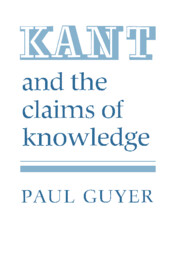Book contents
- Frontmatter
- Contents
- Acknowledgments
- Note on sources
- Introduction
- Part I Kant's early view
- 1 The problem of objective validity
- 2 The transcendental theory of experience: 1774–1775
- Part II The transcendental deduction from 1781 to 1787
- Part III The principles of empirical knowledge
- Part IV The refutation of idealism
- Part V Transcendental idealism
- Afterword
- Notes
- Index of passages cited
- General index
1 - The problem of objective validity
Published online by Cambridge University Press: 09 March 2010
- Frontmatter
- Contents
- Acknowledgments
- Note on sources
- Introduction
- Part I Kant's early view
- 1 The problem of objective validity
- 2 The transcendental theory of experience: 1774–1775
- Part II The transcendental deduction from 1781 to 1787
- Part III The principles of empirical knowledge
- Part IV The refutation of idealism
- Part V Transcendental idealism
- Afterword
- Notes
- Index of passages cited
- General index
Summary
The emergence of a problem
Though Kant coined his name for the problem of synthetic a priori knowledge only well into his career, he criticized from the outset the rationalist assumption that the a priori knowledge characteristic of general and special metaphysics could be derived from analysis according to laws of logic alone. Thus his earliest purely philosophical writings, the New Exposition of the First Principles of Metaphysical Knowledge (the Nova Delucidatio) of 1755 and The Only Possible Proof of the Existence of God of 1762, argue that sufficient reasons for the determinations of real objects could not be established just by the analyses of what are in fact merely concepts of possible objects in accord with the laws of identity and noncontradiction alone, but that there must also be an explanation of the logically contingent limitation of real possibilities to some subset of the formally consistent conceptions of objects. These works thus first express Kant's most fundamental claim that all analysis presupposes synthesis (e.g., B 133–4), and therefore that analysis alone can never be the basis of knowledge, metaphysical or otherwise. But only more gradually did it become clear to Kant that if the basic laws of metaphysics were synthetic – not true by logic alone, and thus not true of all possible objects of logical thought whatever – a special account would have to be given of how these principles could be known a priori and yet also be known to be true of objects, independent of our mere thought of them.
- Type
- Chapter
- Information
- Kant and the Claims of Knowledge , pp. 11 - 24Publisher: Cambridge University PressPrint publication year: 1987



